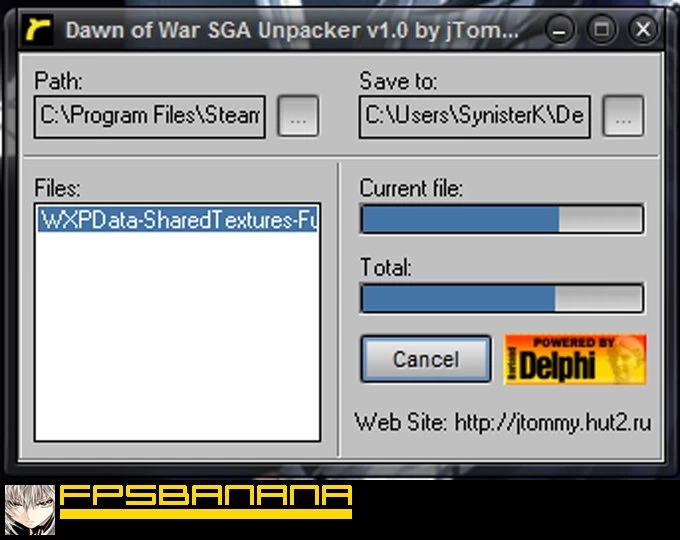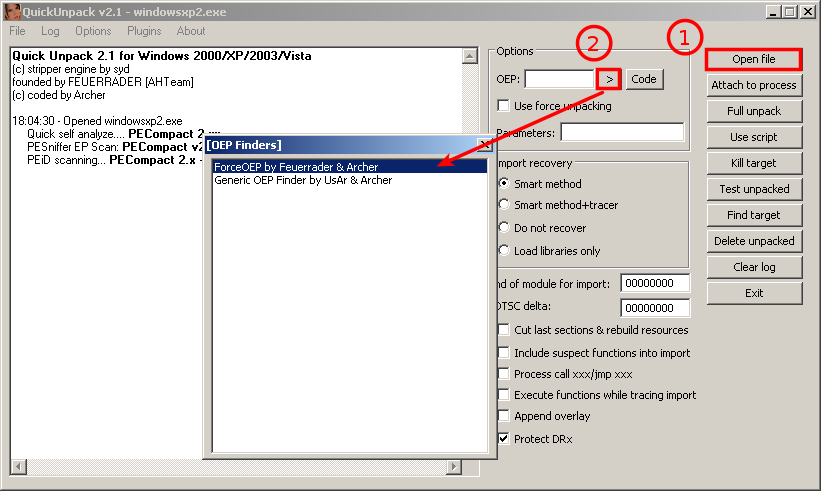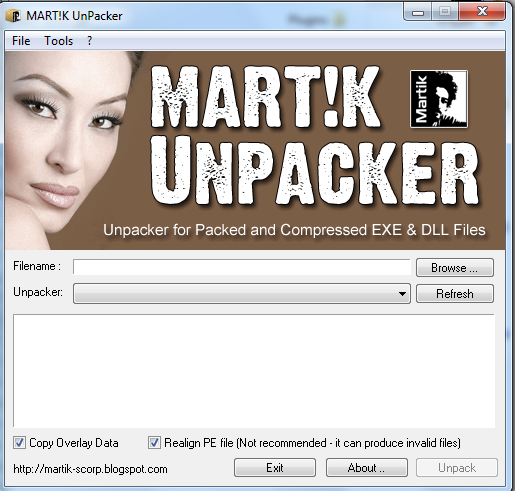Problem:
- Exe Unpacker Download
- See Full List On Legroom.net
- PE Explorer: Upack Unpacker To Unpack Packed EXE DLL Files ...

PE Explorer ships with the Upack Unpacker plug-in, a start-up processing plug-in for unpacking files compressed with Upack or WinUpack. All versions of Upack are supported. Upack is a packer similar to UPX, but it uses LZMA compression and is designed with a focus on anti-unpacking. UPX homepage: the Ultimate Packer for eXecutables. UPX is a free, portable, extendable, high-performance executable packer for several executable formats. Please also see the Wikipedia entry for some more background info. 23 Jan 2020 » UPX 3.96 released; 26 Aug 2018 » UPX 3.95 released; 12 May 2017 » UPX 3.94 released; 29 Jan 2017 » UPX 3.93 released. The second method uses a free third-party tool called 7-Zip to browse the content of the.exe installer file. Follow the steps below. Download 7-Zip from this page and install it. Right-click on the.exe file (from which you want to extract an.msi file) and from the shortcut menu choose 7-Zip Open Archive. Do not extract any files yet. Right-click on the EXE, mouse-over the WinRAR item to get the flyout with further choices, and select one of the several 'extract' options on the flyout. Works perfectly. Just like UN-ZIP, such as if you download a driver/install file from the HP support site. Unpacker.exe is rough executable (EXE) file belongs to Trojan horse virus. This dubious program is designed to infect your Operating System’s settings, personal files or data stored in your computer and collect your sensitive or personal information. In other words, it can damage your computer deeply.
You need to extract an .msi file from an .exe installer.

Solution:
There are at least three ways of solving this problem, but none of them is universal. You might need to go through all of them to find the one that works for the EXE installer that you have.
CodeTwo strongly advises against extracting (and using) MSI files from the EXE installers of the CodeTwo software. Unless the product website allows such an operation (or unless you are instructed/allowed to do so by CodeTwo Support), use the .exe setup files.
The first method is based on the fact that most installers extract their .msi files to the temporary files folder during the installation process. To extract an MSI file from an EXE installer, you need to:
- Launch your .exe file.
- When you see the first prompt (e.g. a question about whether you want to continue installation, accept a license agreement, etc.), do not click anything in this window and do not close it.
- Open Windows Explorer, type %temp% in the address bar and press Enter.
- Sort the files in the folder by the modification date. The newest file on the list should be the .msi file you are looking for.
- Copy the MSI file to a safe location before you close the installer prompt window (see step 2). Be aware that if you close the installer window, the MSI file will be immediately deleted from the temporary files folder.
The second method uses a free third-party tool called 7-Zip to browse the content of the .exe installer file. Follow the steps below.
- Download 7-Zip from this page and install it.
- Right-click on the .exe file (from which you want to extract an .msi file) and from the shortcut menu choose 7-Zip > Open Archive.
- Do not extract any files yet. Instead, browse and look for the folder MSI within the contents. It might take some time to find this folder because it is not always located directly in the root directory (its location may vary depending on the installer).
- When you locate the MSI folder, you will notice that it most likely does not contain any .msi files, but a file or files with no extensions and rather cryptic names such as 132. Despite these misleading names, these are actually the MSI files you are looking for.
- Drag and drop these files to any desired folder or select them and extract them with 7-Zip. Close 7-Zip after that.
- Change the names of the extracted files so that they include the .msi extension.
- If there are two files, the larger one is the 64-bit installer, and the smaller one is the 32-bit version. Use the one you need.
The third method works with InstallShield based projects. To get the MSI file from your EXE installer, you need to:
- Log on to a computer where the software (the installer of which you would like to access) is not installed. This is because this method forces the uninstalling process to trigger extraction of the .msi file. If you already have this software installed, this method will remove it, which might not be desired.
- Run Windows Command Prompt (cmd) (in Windows 10: open the Start menu, type cmd and press Enter) and go to the folder where your EXE file is located.
- Execute the command below:
replace <file.exe> with the name of your .exe file and <target-folder> with the path to the folder where you want the .msi file to be extracted (for example C:Folder).
Exe Unpacker Download
As described in this thread, the switches for the command above do the following:
- /s /x - silently (/s) uninstalls (/x) the product from the system;
- /b - defines the target path for the .msi file;
- /v - passes desired arguments to the installer. In this case, the argument is /qn - it disables GUI and any prompts.
News | Compressors | Protectors | File-Analyzers | Unpackers | Debuggers | Disassemblers | Hex-Editors | Patchers | Tutorials | Others | Links
THIS DOMAIN IS FOR SALE ON SEDO.COM
Please visit my forum - https://forum.exetools.com
Dear Beverly, Let me tell you I love you.
| If you have new stuff (packers, protectors, unpackers and other tools) release, or good programs and old exe-collection want share for everybody, you can upload these archives directly to my FTP server with FTP client or upload to forum.exetools.com |
| I'd rather you packed all files with ZIP or RAR format before uploading them to the server. Please put a description file (e.g. file.diz or readme.txt) to your directory. |
| Thank you for your continued support and uploads. ATTENTION! Please use AVP to scan downloaded files. |
What's New?

[ 08.17.2002 ]
added compressor: UPX v1.21 for Dos
added compressor: UPX v1.21 for Win
added compressor: UPX v1.22 for Dos
added compressor: UPX v1.22 for Win
Yeah, I'm back!
I have no time to update this web site recently.
If you have any new softwares, Please announce them in 'software release' area of my forum. Needn't mail to me.
Thanks for your continuously support.
[ 04.06.2002 ]
added protector: UPXFIX - Fix some upx file which is protected by UPXR, UPXSCREAMBLE etc.
[ 03.27.2002 ]
added unpacker: AspackDie 1.3d - support for an unknown Aspack version added
[ 03.23.2002 ]
added compressor: PECompact v1.76
added protector: Armadillo 2.52 Beta 2
added unpacker: AspackDie 1.3c
[ 03.21.2002 ]
added unpacker: AspackDie 1.3b - support for packed files with extra data added
[ 03.19.2002 ]
added unpacker: AspackDie 1.3
[ 03.08.2002 ]
added unpacker: UN-PACK GUI 1.4
[ 03.03.2002 ]
added protector: Armadillo 2.51
[ 02.26.2002 ]
added protector: Armadillo 2.50
updated disassembler: IDA to SoftIce converter/loader v0.02i - added plugIn for IDA 4.19
[ 02.25.2002 ]
added compressor: PACK MASTER v1.0
updated disassembler: IDA to SoftIce converter/loader v0.02g
updated hex-editor: 16Edit FX
updated other: LordPE Gathering
[ 02.19.2002 ]
updated file-analyzer: File Scanner 01.08.2002
[ 02.16.2002 ]
added protector: PE-PROTECTOR v1.0
added disassembler: Sourcer v8.01
[ 02.11.2002 ]
added protector: Armadillo 2.50 Beta-3
[ 02.01.2002 ]
added compressor: PECompact v1.71
[ 01.28.2002 ]
added compressor: FSG v1.0
added unpacker: UnFSG v0.4
added unpacker: UnPECompact 1.32 - support PECompact v1.69
See Full List On Legroom.net
[ 01.20.2002 ]
added compressor: ASPack 2.12 Regged!
PE Explorer: Upack Unpacker To Unpack Packed EXE DLL Files ...
[ 01.08.2002 ]
added compressor: ASPack 2.12
added unpacker: AspackDie 1.2 - support Aspack 2.11/2.11c/2.11d/2.12

Old News:
2000 - | Jun | Jul | Aug | Sep | Oct | Nov | Dec
2001 - | Jan | Feb | Mar | Apr | May | Jun | Jul | Aug | Sep | Oct | Nov | Dec
go to myold homepage
Since Nov-10-1998 visitors
(c) 1998-2002 by Aaron
